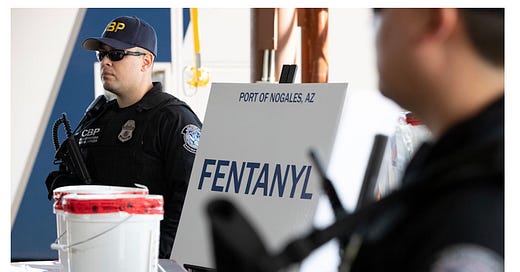To Stop the Fentanyl Epidemic and Boost U.S. Manufacturing, End the De Minimis Loophole
This is my latest piece, published to Townhall.com, on how a second Trump administration can stop the fentanyl epidemic and boost U.S. manufacturing by closing the “de minimis” loophole, which allows packages with declared value of less than $800 to be imported into the United States without inspection by Customs and Border Protection (CBP).
The full text of the piece is pasted below, and can also be read here: https://townhall.com/columnists/adam-molon/2024/10/22/to-stop-the-fentanyl-epidemic-and-boost-us-manufacturing-end-the-de-minimis-loophole-n2646511
Throughout their failed administration, Kamala Harris and Joe Biden have enabled communist China to fuel an unprecedented fentanyl epidemic in the United States by allowing the Chinese exploitation of the lax “de minimis” rule for imported packages. If Donald Trump wins back the White House, his first course of action should be to ban de minimis altogether in order to save American lives, incentivize U.S. manufacturing, and stop slave-labor operations in China and other countries from taking advantage of consumers.
The de minimis rule directs Customs and Border Protection (CBP) agents to inspect certain foreign packages that have claimed valuations of more than $800 to collect appropriate duties and fees for the federal government. Packages that fall under the $800 threshold, however, are not subject to duties or fees.
For years, the Biden-Harris administration has allowed China to take advantage of de minimis by allowing their e-commerce platforms to flood the U.S. market with counterfeit, slave-labor-made clothing. Packages of clothing from China and other countries currently enter the American market duty-free because their stated values are typically under the de minimis threshold, putting U.S. companies out of business. The U.S. textile industry is now competing with hundreds of millions of de minimis shipments.
The current administration has also allowed Chinese and Mexican drug traffickers to send fentanyl right to Americans’ doorsteps via the de minimis loophole. Ninety percent of America’s packages now enter the country duty-free and with minimal paperwork or inspections, mostly by air.
Why? Because they fall below $800 in stated value. Senders are thereby easily able to falsify documents explaining what is really inside, along with the value of the good being exported. As Dr. Peter Navarro, former White House Director of the Office of Trade and Manufacturing Policy, has written, communist China is now “responsible for at least 90 percent of illicit fentanyl in the United States.” This is in large part enabled by a legal loophole, dating back to 2016, that raised the de minimis threshold from $200 to $800. Tom Homan, former Director of Immigration and Customs Enforcement (ICE), told me separately in an interview that China is “poisoning the country” with fentanyl, noting that China produces the precursors to the drug which it then sells to criminal cartels in Mexico.
A recent report from the Congressional Select Committee on the CCP echoes this harsh reality. From funding illicit fentanyl precursor chemicals to holding ownership interests in companies tied to drug trafficking, China is largely responsible for the leading cause of death for Americans aged 18 to 45. More than 74,000 Americans were killed by fentanyl last year, and yet the Biden-Harris administration has failed to secure America’s borders.
Americans are rightly placing their hope in Trump, who has consistently backed up his promises on border security with action. A Trump ban of the de minimis loophole through the executive authority granted by the Tariff Act of 1930 could stop the U.S. from funding a substantial amount of slave labor abroad, defend American manufacturing from foreign competition, and save American lives from the fentanyl flooding across our borders.
Congress has already proposed legislation to set de minimis thresholds that are reciprocal with other countries. However, partial reform would not be sufficient, given the magnitude of the problem regarding slave-labor-produced items and other illicit goods crossing our borders. A full ban on de minimis is necessary.
Former Trade Representative Robert Lighthizer similarly argues for shrinking the de minimis threshold to $50 or $100—another step in the right direction. This would reduce the amount of illicit drugs entering the country, since non-pharmaceutical fentanyl on e-commerce platforms sells at approximately $139 per gram for amounts over five grams (2,500 times over the two milligrams considered a lethal dose). However, to stop the flow of both fentanyl and slave-labor-made goods from entering the U.S., all packages from overseas should be subject to inspection, duties, and fees.
If all packages from abroad were inspected, there would be increased demand for hiring more Americans as CBP officers, and any extra time needed for inspection would advantage domestically produced goods in the U.S.—a boon to economic activity and national security. Ensuring that illicit, slave-labor-produced goods are more expensive and difficult to import will help turn Americans back to buying goods from companies that employ U.S. workers.
As much as 75 percent of all new goods sold on Amazon are Chinese-made. If Trump were to subject every imported package to inspection during a second term, companies like Amazon would be forced to offer more American-made goods in order to compete, and dangerous Chinese e-commerce platforms profiting from slave labor and fentanyl would unravel.
Let’s start by ending the de minimis loophole in 2025. The job-killing loss for China would be a life-saving win for America.
Adam Molon is an investigative journalist, China scholar, and the author of NewSentry.




